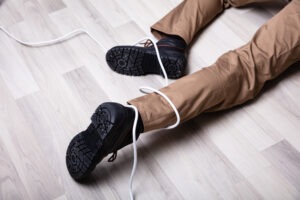
The outcome of a slip and fall can range from minor to fatal. Aside from the physical pain, victims report experiencing mental anguish, financial hardship, and sometimes permanent disability. If you’ve been hurt and are experiencing an endless back and forth with the insurance company or the property owner about who is liable for your slip and fall, seek legal help.
It’s crucial to obtain legal advice from an experienced personal injury attorney who can advise you on what to do after your slip and fall accident. The next steps may entail bringing legal action against the property owner or negotiating a settlement with their insurance company. Learn how to safeguard your legal rights and increase your chance of recovering compensation.
Why Would a Property Owner Deny Responsibility for a Slip and Fall Claim?
Here are a few explanations as to why a property owner could dispute liability for a slip-and-fall incident:
- Lack of evidence: If the property owner feels there isn’t enough proof to show that their negligence caused the accident, they may refuse to accept responsibility.
- Shared negligence: According to the property owner, the person who slipped and fell was largely or entirely to blame for the accident since they were careless or wearing the wrong shoes. Depending on which state the accident occurs in, a lawyer can explain the difference between contributory and comparative negligence.
- Absence of information: The property owner may argue that they are exempt from liability because they had no awareness of the hazardous condition that led to the slip and fall.
- Assumption of risk: The property owner may contend that a slip-and-fall victim assumed the risk of injury by partaking in a risky activity like walking on an icy sidewalk, and as a result, cannot be held liable.
- Legal deadline expired: Victims must abide by the statute of limitations, a certain length of time allotted by the courts to bring a claim, which varies by state and the nature of the case. The property owner may argue that the claim is time-barred and that they are not liable if the injured party waits too long to submit a claim.
Expect More, Receive More: Legal Support That Feels Like Family
Should I Contact the Owner Directly to Negotiate a Settlement?
In order to resolve a slip and fall claim, it is generally not advised to speak with the property owner directly. By doing so, you run the risk of damaging your case and limiting your opportunity to get just compensation for your losses and injuries. If they are aware that you lack representation, the property owner or their insurance provider may offer a lowball settlement.
The best thing to do after a slip and fall accident or if the owner denies responsibility for your claim is to seek legal counsel who can represent you in negotiations with the property owner or their insurance provider.
What Can I Do if My Slip and Fall Claim Gets Dismissed?
You may still receive compensation even if your slip and fall claim is rejected. The following options can help you recover some of your losses:
Dispute Resolution With the Insurance Adjuster
Allow a qualified personal injury lawyer to communicate with the insurance adjuster on your behalf. If you don’t, you may unintentionally say something that the adjuster will use as evidence to reject your claim. An attorney can demand that the adjuster provide a written explanation of the reasons your claim was dismissed and take appropriate action afterward.
File a Claim Against An Alternative At-Fault Party
Injury cases often have multiple negligent parties. In the event that one party dismisses your claim, you can file a complaint with the other party. For instance, if you slip and fall at an apartment complex on a cord from a leaf blower, the gardening contractor that is responsible for the leaf blower may be held accountable.
Take Legal Action
A lawsuit can be filed in civil court after you are denied reimbursement for your personal injury expenses. You will be able to take legal action against the other party directly in the county where the accident took place. If you are seeking small damages, a small claims court may be best. Otherwise, a lawyer can begin the litigation process to get you rightfully compensated.
Will My Slip and Fall Case Be Affected if the Property Owner Denies Responsibility?
It can be more difficult to prosecute a successful lawsuit if the property owner disputes liability for a slip and fall accident, but you can still take legal action.
If you hire an attorney to compile proof to back up your assertion, they can submit your images or videos of the accident scene, medical records, and interview witnesses that can solidify your claim. In order to prove the negligence of the property owner and how it led to the accident, they might also need to retain the services of an expert witness.
The particular rules and legal requirements in your state will also have an impact on your case. Some states have strict liability laws that apply to property owners.
Is Hiring a Slip and Fall Attorney Expensive?
The price of a slip and fall attorney might differ based on the intricacy of your case, the attorney’s reputation, and their level of experience. Some attorneys may take a percentage of the settlement on a contingency basis, which means they only get paid if they win your case. The proportion usually ranges between 33 and 40 percent of the total settlement award.
The hourly rates of other attorneys can range from a few hundred to several hundred dollars. If you have an active slip and fall case and the owner is evading responsibility, your next steps, concerns, and attorney fees can be discussed in a complimentary consultation.



